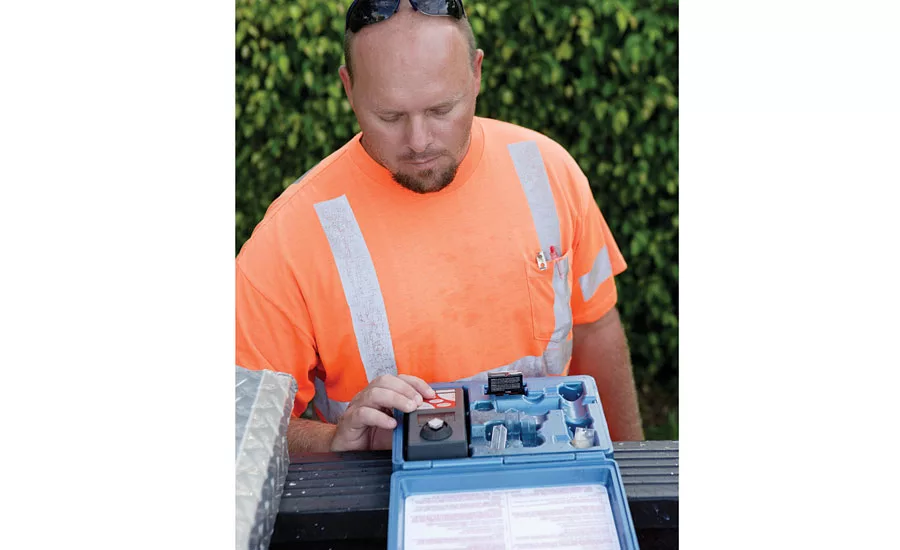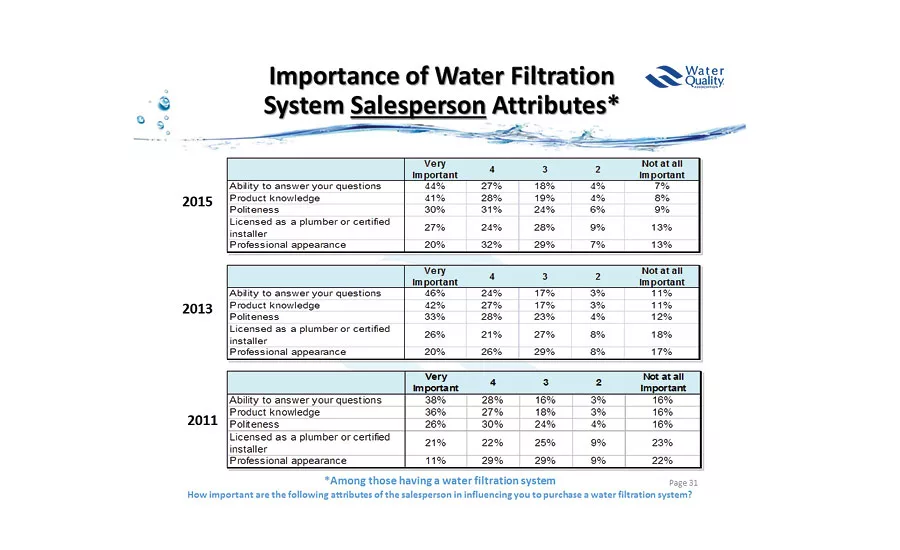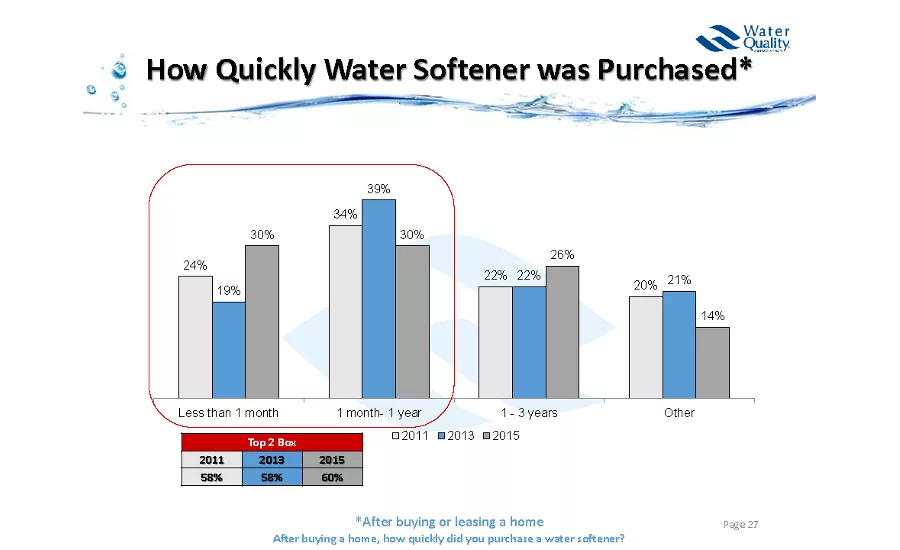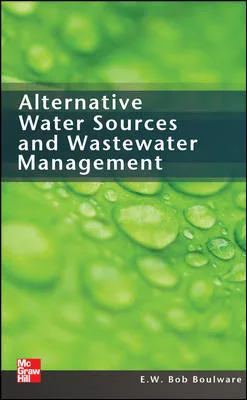Relieving customer water concerns
Water worries for consumer drinking water.

More than half of consumers are worried about the water quality in their homes. Plumbing contractors are natural leaders in water quality and should take a serious look at entering the home water treatment industry.Photo credit: ©istockphoto.com/Terry J Alcorn

Product knowledge and the ability to answer customer questions are top attributes consumers are looking for in water treatment professionals as they consider the best equipment to buy for their homes.Photo credit: Water Quality Association. WQA does not sanction the interpretations or conclusions resulting from ongoing analysis of study data.

About three-quarters of consumers surveyed for the Water Quality Association study purchase bottled water for their homes, while less than half have any kind of water filtration device. Photo credit: Water Quality Association. WQA does not sanction the interpretations or conclusions resulting from ongoing analysis of study data.

More than half of survey respondents say their main area of concern about their drinking water supply is waterborne contaminants. They would be willing to buy a home water treatment system if it could remove contaminants such as lead, arsenic, chlorine and pharmaceuticals. Photo credit: Water Quality Association. WQA does not sanction the interpretations or conclusions resulting from ongoing analysis of study data.

Water softeners can improve the performance of water heaters, boilers, dishwashers and washing machines in areas with hard or corrosive water, as well as prolong the life of the equipment. Nearly two-thirds of survey respondents bought a water softener within a year after purchasing their homes. Photo credit: Water Quality Association. WQA does not sanction the interpretations or conclusions resulting from ongoing analysis of study data.
Contaminated drinking water is making headlines again, this time in Flint, Mich.
For nearly two years, the residents of this Detroit suburb have spent thousands of dollars on bottled water and filtration systems because the water coming out of their faucets is full of lead and is too toxic to drink.
To save money, the cash-strapped city stopped buying its drinking water from Detroit and began treating Flint River water for potable use while a new pipeline to Lake Huron was being built. But water coming from the tap was discolored and had a bad odor. It was caused by the river’s aggressive water, which caused corrosion and rust to build up in the unlined cast-iron and iron water-distribution piping. And lead piping from city water mains to homes was leaching lead into the drinking water. Many homes had levels of lead in the hazardous-waste range.
High levels of Coliform bacteria were found in the drinking water, indicating fecal contamination. The sewage treatment plant dumps into the Flint River, and Coliform bacteria is found if sewage is not treated properly. Many people in Flint became sick because of tainted water; some died.
Among the first to call attention to the lead contamination in Flint’s water was Marc Edwards, professor of civil and environmental engineering at Virginia Tech and a nationally renowned expert on water treatment and corrosion.
Last month, Michigan Gov. Rick Snyder acknowledged that Genesee County, which includes Flint, had a large outbreak of Legionnaire’s disease. MichiganRadio.org reports the county had 87 cases of the disease, resulting in 10 deaths from June 2014 to November 2015. In previous years, the Legionella bacteria caused about eight to 10 cases. The current outbreak came during the time Flint switched its water supply from Detroit to the Flint River.
Responding to the news of the Legionnella outbreak, Edwards told MichiganRadio.org: “The general idea is that the lack of corrosion control in the Flint system ate up the disinfectant, the chlorine that’s normally put in the water to kill these bacteria and it also caused the release of iron to the water. And so those two factors in our laboratory experiments dramatically increased the amount of Legionella that grew in water heaters and hot water systems.”
The EPA is under fire for burying the problem in Flint and not taking action, as are various state and local officials. The Obama administration has freed up $5 million to assist Flint residents but at press time fell short of granting a federal state of emergency. (To read more about the water crisis and the people affected, read here.)
Consumer concerns
Flint is an extreme case, but many of your customers also are worried about the quality of their drinking water. In a March 2015 study conducted by Applied Research-West for the Water Quality Association (the 2015 National Study of Consumers’ Opinions and Perceptions Regarding Water Quality), more than half of consumers (56%) are “concerned” or “very concerned” about the quality of their water supply. And more than half of respondents say their main area of concern is waterborne contaminants.
Federal laws about drinking water quality are not strict enough, say 46% of respondents, and almost three-fourths (70%) say their local municipality has the primary responsibility for providing safe drinking water to their homes. In fact, many consumers in the study (60%) would be willing to pay more on their water bills for removal of contaminants and pharmaceuticals from the water supply.
Bottled water is still king; almost 80% of survey participants buy bottled water and only 43% say they have any type of water filtration product installed in their homes. Only 7% say they have stopped buying bottled water overall and chosen a water filtration system instead; that is down from 12% in 2013. The top reasons people buy bottled water is because their tap water doesn’t taste good and they’re worried about contaminants. These also are the reasons people buy water filtration systems.
These statistics indicate point-of-use or point-of-entry water treatment systems may be worthwhile solutions in areas with poor water quality, the study notes. “More than 99% of the water coming into our homes is not used for drinking,” the report says. “By installing protection at or near the tap, consumers can protect the water that is most important to them.”
People in communities with boil water alerts are more likely to purchase water filtration systems; nearly half of consumers (48%) say they bought a filtration device after the water in their area was deemed unsafe or a boil alert was issued — either a filtered water pitcher, end-of-tap device or a refrigerator filter system.
While concerns about water quality and a healthy lifestyle are reasons why people install water filtration products in their homes, study respondents seem to be split as to whether these systems are a luxury or a necessity. It seems that consumers need more education as to how water treatment systems can make their water safer to drink as well as save them money. With a water filtration system installed in their homes, consumers won’t need to buy bottled water.
Knowledge equals opportunity
With the focus on Flint and its water crisis, plumbing contractors have an opportunity to add water filtration/water treatment to their businesses. We’ve profiled many companies in this magazine that offer these services to their customers and are making a profit. But how did they do it?
Training, training and more training. Like any other aspect of plumbing, to enter into and succeed in the water treatment business, contractors need to educate themselves on the industry — the different types of water contaminants, how they affect the human body, what the different filtration products are and how they work.
“Product knowledge and the ability to answer the consumer’s questions were considered the most important attributes in a salesperson of water filtration equipment,” the WQA study notes. And study respondents are willing to pay more for home water treatment systems to remove biological waste, arsenic, lead and other contaminants.
Industry resources are available for plumbers to learn about these issues. For those interested in residential services, the Water Quality Association offers online training to members and nonmembers through its Modular Education Program. The MEP has training levels for all water professionals, regardless of whether they are a WQA member or pursuing certification. And the program has specific educational pathways for nontechnical staff, sales and marketing personnel, installers, service technicians and system designers.
“MEP is a mixture of online learning and hands-on practice; it has a mentorship component,” says Larry Deutsch, WQA’s marketing and communications director. “It covers all aspects of water treatment — such as products, contaminants, professionalism, business practices — everything you need to know to become a professional in this field.”
Credibility is important because consumers want water professionals who are knowledgeable about local water issues and able to recommend effective solutions. WQA also provides water treatment professionals with six certifications (four at core level and two at master level):
- Certified Water-Treatment Representative.This designation is for the professional whose job focuses on solving aesthetic water problems, such as taste.
- Certified Water Specialist.This designation is for professionals who provide solutions to “problem water” issues and health-related contaminants.
- Certified Installer.This designation is ideal for professionals who specialize in installing water-quality improvement products.
- Certified Service Technician.This designation is intended for professionals responsible for troubleshooting and correcting the operation of water-quality improvement products.
- Master Water Specialist and Master Service Technician.Candidates must demonstrate an appropriate level of expertise in the field by completing the advanced coursework in WQA’s Modular Education Program, passing two advanced-level exams, and attaining a minimum of five years’ active field work experience.
For those plumbers looking at jobs at city water plants, the American Water Works Association also has online, self-paced courses dealing with all aspects of treating the public water supply, as well as webinars on dealing with contaminants.
Having a professional certification is not high on consumers’ lists of water treatment professional attributes, but it does reinforce the credibility that the certified professional has the proper knowledge to diagnose and resolve a homeowner’s water quality issues.
For plumbers looking to partner with a manufacturer, Deutsch suggests attending water quality trade shows to learn about and talk with industry manufacturers. But make sure your water treatment partner provides training and technical support, as well as certified products. Two-thirds of consumers in the WQA study believe product certification — from WQA, Underwriters Laboratories or NSF International — is an important factor in choosing a filtration system.
WQA’s annual convention and expo includes educational sessions along with the trade show; 2016 dates are March 14-17 in Nashville, Tenn., and 2017 dates are March 27-30 in Orlando, Fla. And it’s a good bet that if your area has a water problem, manufacturers will be displaying their solutions at local and regional home shows.
Plumbing contractors are natural leaders in water quality. You deal with water every day. You have the training and knowledge to deal with a customer’s water piping, fixtures, water heater or dishwasher. Add in water treatment services, and you’re the whole package.
This article was originally titled “Water worries” in the February 2016 print edition of Plumbing & Mechanical.
Looking for a reprint of this article?
From high-res PDFs to custom plaques, order your copy today!





